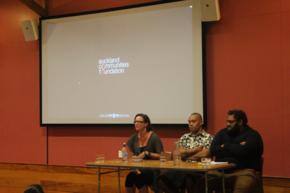Tackling the r-word

The rapidly changing demographics of different countries have left people around the world struggling to cope with a problem that is insidiously injected in the fabric of the society. Blatant racism doesn’t go unnoticed, but it is the snide remarks, often concealed in classrooms and the corridors of universities that create a hostile environment for students from diverse backgrounds.
I, too, am Auckland, a University of Auckland student-run initiative based on a Polynesia, Maori and wider university community collective, challenges people to rethink racial stereotypes. On Tuesday, January 19, they released a series of four new videos at Waipapa Marae where the university’s students spoke about their personal experience of everyday racism during their tertiary study. Following last year’s social media campaign aimed at raising awareness about the issue, this year, the videos, aptly titled as Conversations, focussed on the power of conversation as a tool to address the problem of racism in New Zealand.
The videos featured participants from different ethnicities. Through the conversation sessions, the participants spoke about how the issue can be tackled to make the university a safe place for minorities. “Mutual support and cooperation within groups is more productive and is what is going to progress us socially,” says Lydia Batson, a video participant.
Racial microaggressions are unpleasant and jarring for individuals who are victimised. But it is a struggle that they need to fight alone, an opinion echoed by Bartek Goldmann, another video participant. He says, “Addressing racism shouldn’t be a struggle only left to the people of colour. It is not fair to leave that battle only to be fought by those who are victimised by it most.”
The biggest challenge that minorities experience is being labelled and judged, says Sehar Moughal, a video participant. “In academic settings, it means not getting into a course of being pushed around when you go to administration. It means being ignored in a line until you speak up to get their attention. On a larger scale, you lose opportunities. You don’t get scholarships or grants.”
Moughal believes that the first step that needs to be taken is to bring about awareness. “I became a part of I, too, am Auckland because I think it is challenging the status quo. It is challenging those in a position of power to start taking racism seriously. They might think they are not being racist but it is happening. If guidelines are there, they must be adhered to. Students’ rights should be made more accessible. More conversations need to happen around this,” she says.
The rapidly changing demographics of different countries have left people around the world struggling to cope with a problem that is insidiously injected in the fabric of the society. Blatant racism doesn’t go unnoticed, but it is the snide remarks, often concealed in classrooms and the corridors...
The rapidly changing demographics of different countries have left people around the world struggling to cope with a problem that is insidiously injected in the fabric of the society. Blatant racism doesn’t go unnoticed, but it is the snide remarks, often concealed in classrooms and the corridors of universities that create a hostile environment for students from diverse backgrounds.
I, too, am Auckland, a University of Auckland student-run initiative based on a Polynesia, Maori and wider university community collective, challenges people to rethink racial stereotypes. On Tuesday, January 19, they released a series of four new videos at Waipapa Marae where the university’s students spoke about their personal experience of everyday racism during their tertiary study. Following last year’s social media campaign aimed at raising awareness about the issue, this year, the videos, aptly titled as Conversations, focussed on the power of conversation as a tool to address the problem of racism in New Zealand.
The videos featured participants from different ethnicities. Through the conversation sessions, the participants spoke about how the issue can be tackled to make the university a safe place for minorities. “Mutual support and cooperation within groups is more productive and is what is going to progress us socially,” says Lydia Batson, a video participant.
Racial microaggressions are unpleasant and jarring for individuals who are victimised. But it is a struggle that they need to fight alone, an opinion echoed by Bartek Goldmann, another video participant. He says, “Addressing racism shouldn’t be a struggle only left to the people of colour. It is not fair to leave that battle only to be fought by those who are victimised by it most.”
The biggest challenge that minorities experience is being labelled and judged, says Sehar Moughal, a video participant. “In academic settings, it means not getting into a course of being pushed around when you go to administration. It means being ignored in a line until you speak up to get their attention. On a larger scale, you lose opportunities. You don’t get scholarships or grants.”
Moughal believes that the first step that needs to be taken is to bring about awareness. “I became a part of I, too, am Auckland because I think it is challenging the status quo. It is challenging those in a position of power to start taking racism seriously. They might think they are not being racist but it is happening. If guidelines are there, they must be adhered to. Students’ rights should be made more accessible. More conversations need to happen around this,” she says.









Leave a Comment